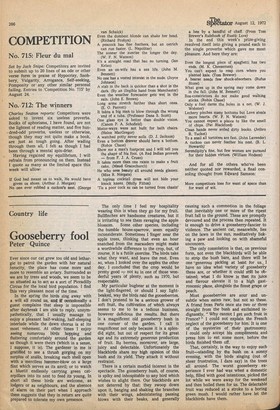Country life
Gooseberry fool
Peter Quince
Ever since our cat grew too old and lethargic to patrol the garden with her natural ferocity, the place has come more and more to resemble an aviary. Surrounded as we are by trees and woods, we seem to be so situated as to act as a sort of Piccadilly Circus for the local bird population. I find this very pleasant most of the time.
In the spring the birds sing away with a will all round us, and if OCCIasalonally a guest complains that sleep is impossible after daybreak I am able to reply, unsympathetically, that I usually manage to enjoy a pleasant half-waking, half-sleeping interlude while the dawn chorus is at its most vehement. At other times I enjoy seeing numerous birds hopping and fluttering comfortably around the garden as though it were theirs (which in a sense, I suppose, it is). The gardener in me is gratified to see a thrush gorging on my surplus of snails, breaking each shell open with a merciless hammer-blow on a large flint which serves as its anvil; or to watch a bluetit endlessly carrying green caterpillars into its nest to feed its young, In short all these birds are welcome, as lodgers or as neighbours, and the absence of alarm on their part when I approach them suggests that they in return are quite prepared to tolerate my own presence. The only time I feel my hospitality wearing thin is when they go for my fruit. Bullfinches are handsome creatures, but it is irritating to see them ravaging the apple blossom. Some other species, including the humble house-sparrow, seem equally inconsiderate. Sometimes I linger near the apple trees, thinking that even an hour snatched from the marauders might make a worthwhile difference to the crop, but, of course, it is a futile exercise. The birds take what they want, and leave the rest. Even so, when I looked over the apples the other day, I concluded that the crop would be pretty good not as in one of those wonderful years of plenty, such as 1970, but respectable.
My particular bugbear at the moment is the light-fingered, or should I say lightbeaked, way the birds raid the gooseberries. I don't pretend to be a serious grower of soft fruit, the cultivation of which always seems to me to be a tedious business, however delicious the results. But there is a magnificent old gooseberry bush in one corner of the garden. I call it magnificent not only because it is a splendid sight, but out of respect for its great age and its extremely generous production of fruit. Its berries, moreover, are large, juicy and delectable. Unfortunately the blackbirds share my high opinion of this bush and its yield. They attack it without restraint.
There is a certain morbid interest in the spectacle. The gooseberry bush, of course, is spiky and inhospitable to any bird which wishes to alight there. Our blackbirds are not deterred by that: they swoop down upon it, banging and shaking the branches with their wings, administering passing blows with their beaks, and generally causing such a commotion in the foliage that inevitably one or more of the ripest fruit fall to the ground. These are promptly devoured and the process then repeated. It is enough to drive a gooseberry-fancier to violence. The ancient cat, meanwhile, lies on the lawn in the sun, meditatively licking a paw and looking on with shameful unconcern.
The only consolation is that, on previous form, not even the blackbirds will be able to strip the bush bare, and there will be one generous picking at least for us. I have no idea what variety of gooseberry these are, or Whether it could still be dbtained; what I do know is that its juice and flavour elevate it to a high gastronomic plane, alongside the finest grape or peach.
Most gooseberries are sour and unsubtle when eaten raw, but not so these. A friend from Paris once ate two or three straight from the bush and exclaimed indignantly, " Why cannot I get such fruit in France?" I could not explain the French neglect of the gooseberry for him. It is one of the mysteries of the4r gastronomy. I could only accept his compliments and press him to eat some more, before the birds finished. them off.
That, certainly, is the way to enjoy such fruit—standing by the bush on a sunny evening, with the birds singing (out of sheer frustration, I dare say) in the trees all around. The worst gooseberry experience I ever had was when a domestic help, filled with good intentions, picked the lot while we were away for the weekend and then boiled them for us. The delectable fruit was reduced at a stroke to a boring green mush. I would rather have let the blackbirds have them.


























 Previous page
Previous page